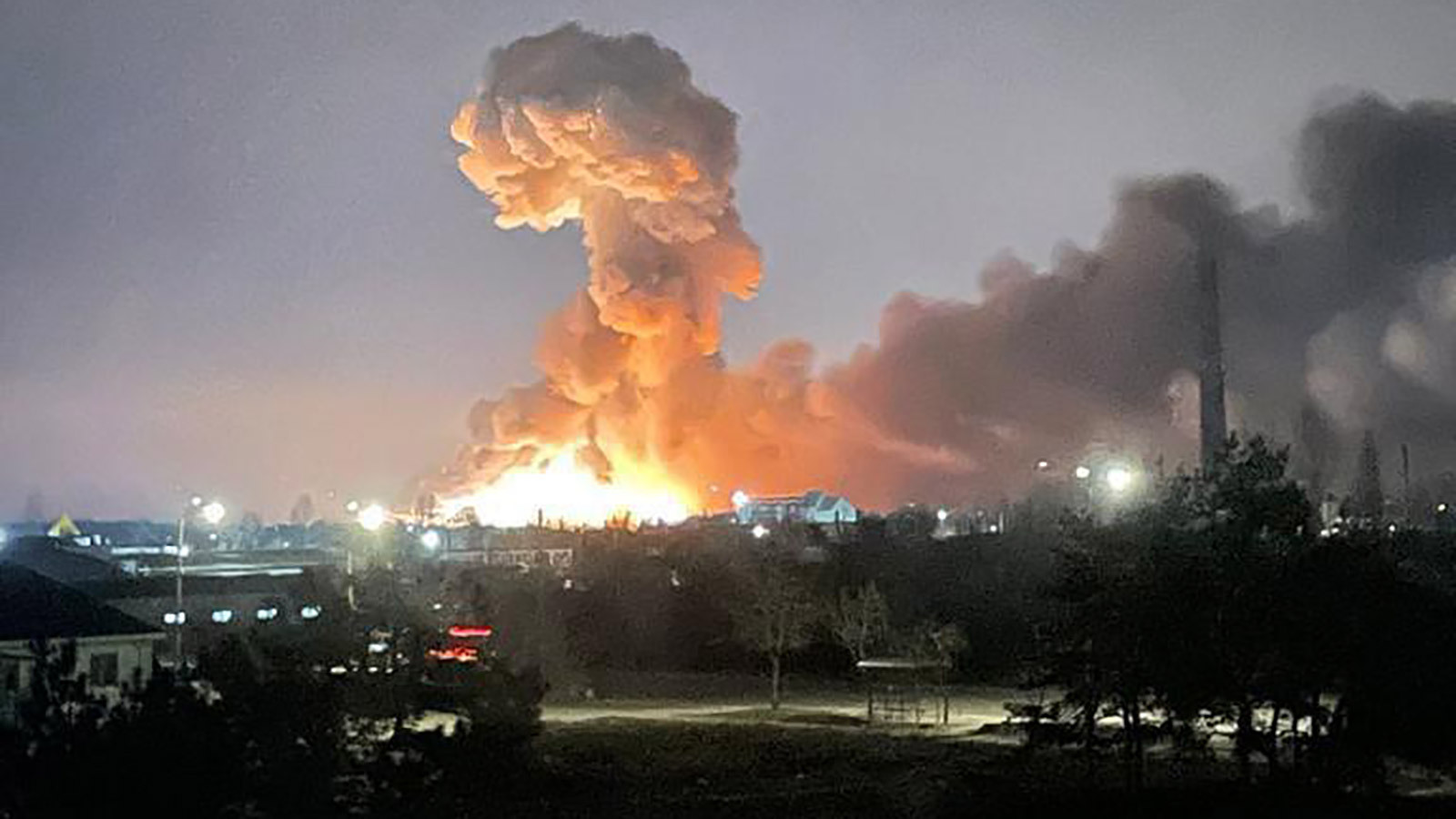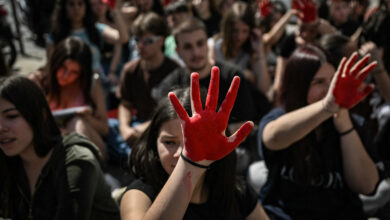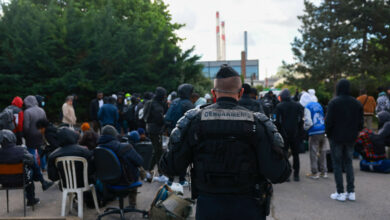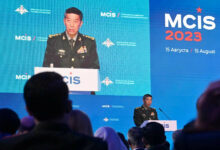
Russian President Vladimir Putin on Thursday announced a military operation in Ukraine and warned other countries that any attempt to interfere with the Russian action would lead to “consequences they have never seen.”
He said the attack was needed to protect civilians in Eastern Ukraine — a claim the U.S. had predicted he would falsely make to justify an invasion.
In a televised address, Putin accused the U.S. and its allies of ignoring Russia’s demand to prevent Ukraine from joining NATO and offer Moscow security guarantees. He said Russia’s goal was not to occupy Ukraine.
As Putin spoke before dawn, explosions were heard in Kyiv, Kharkiv, Odessa and other cities across Ukraine.
The Ukrainska Pravda news website cited a Ukrainian interior ministry official as saying that Ukrainian military command centers in the cities of Kyiv and Kharkiv were attacked by missile strikes.
U.S. President Joe Biden denounced the “unprovoked and unjustified” attack on Ukraine and said the world will “hold Russia accountable.”
In a written statement late Wednesday, Biden that the prayers of the world are with Ukraine.
“President Putin has chosen a premeditated war that will bring a catastrophic loss of life and human suffering,” he said.
“Russia alone is responsible for the death and destruction this attack will bring, and the United States and its allies and partners will respond in a united and decisive way. The world will hold Russia accountable.”
Ukraine’s foreign minister, Dmytro Kuleba, called the attack “a war of aggression.”
A full-blown Russian invasion could cause massive casualties and topple Ukraine’s democratically elected government. And the consequences of the conflict and resulting sanctions levied on Russia could reverberate throughout the world, affecting energy supplies in Europe, jolting global financial markets and threatening the post-Cold War balance on the continent.
Warning to other countries not to interfere
As he unleashed the military action, Putin issued a stark warning to other countries not to meddle.
“I have a few words for those who could feel tempted to interfere with ongoing developments: whoever tries to impede us, let alone create threats for our country and its people must know that the Russian response will be immediate and lead to the consequences you have never seen in history,” he said.
Prime Minister Justin Trudeau condemned the attack and warned the action would be met with “severe consequences.”
In a written statement, he said, “Canada calls on Russia to immediately cease all hostile and provocative actions against Ukraine and withdraw all military and proxy forces from the country. Ukraine’s sovereignty and territorial integrity must be respected and the Ukrainian people must be free to determine their own future.”
NATO Secretary General Jens Stoltenberg called the attack a breach of international law, saying, “NATO allies will meet to address the consequences of Russia’s aggressive actions. We stand with the people of Ukraine at this terrible time. NATO will do all it takes to protect and defend all allies.”
Putin said the Russian military operation aims to ensure a “demilitarization” of Ukraine, and urged Ukrainian servicemen to “immediately put down arms and go home.”
A pretext for war
Putin announced the military operation after the Kremlin said rebels in Eastern Ukraine asked Russia for military assistance to help fend off Ukrainian “aggression.” The announcement immediately fuelled fears that Moscow was offering up a pretext for war, just as the West had warned.
The Ukrainian president rejected Moscow’s claims that his country poses a threat to Russia, and said a Russian invasion would cost tens of thousands of lives.
“The people of Ukraine and the government of Ukraine want peace,” President Volodymyr Zelensky said in an emotional overnight address to his nation in Russian, ahead of the operation. “But if we come under attack, if we face an attempt to take away our country, our freedom, our lives and lives of our children, we will defend ourselves. When you attack us, you will see our faces, not our backs.”
Zelensky said he asked to arrange a call with Russian President Vladimir Putin late Wednesday, but the Kremlin did not respond.
Ukrainian President Volodymyr Zelensky thanked Western nations, including Canada, for sanctions against Russia and warned that the future of European security is being decided ‘now, here, in Ukraine.’ 1:02
In an apparent reference to Putin’s move to sanction the deployment of the Russian military to “maintain peace” in Eastern Ukraine, Zelensky warned that “this step could mark the start of a big war on the European continent.”
“Any provocation, any spark could trigger a blaze that will destroy everything,” he said.
He challenged the Russian claims, saying that “you are told that this blaze will bring freedom to the people of Ukraine, but the Ukrainian people are free.”
At an emergency meeting of the U.N. Security Council called by Ukraine because of the imminent threat of a Russian invasion, members still unaware of Putin’s announcement appealed to him to stop an attack. UN Secretary General Antonio Guterres opened the meeting, just before the announcement, telling Putin: “Stop your troops from attacking Ukraine. Give peace a chance. Too many people have already died.”
Anxiety about an imminent Russian offensive against its neighbour soared after Putin recognized the separatist regions’ independence on Monday, sanctioned the deployment of troops to the rebel territories and received parliamentary approval to use military force outside the country. The West responded with sanctions.
State of emergency
Late Wednesday, Ukrainian lawmakers approved a decree that imposes a nationwide state of emergency for 30 days starting Thursday. The measure allows authorities to declare curfews and other restrictions on movement, block rallies and ban political parties and organizations “in the interests of national security and public order.”
The action reflected increasing concern among Ukrainian authorities after weeks of trying to project calm. The Foreign Ministry advised against travel to Russia and recommended that any Ukrainians who are there leave immediately.
Cyberattacks disrupt key sites
Another wave of distributed-denial-of-service attacks hit Ukraine’s parliament and other government and banking websites on Wednesday, and cybersecurity researchers said unidentified attackers had also infected hundreds of computers with destructive malware.
Officials have long said they expect cyberattacks to precede and accompany any Russian military incursion, and analysts said the incidents hew to a nearly two-decade-old Russian playbook of wedding cyber operations with real-world aggression.








Redes Sociais - Comentários